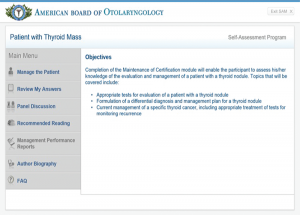Burnout is a major professional issue that needs to be recognized, understood, and mitigated
How Physicians Can Plan for Maternity Leave
Physicians planning a family must learn to work within a system that can be less than accommodating

Would Physicians Perform Better if They Didn’t Have to Memorize?
Medical educators push for less memorization and more focus on how to search for information

Leadership Position, Training Can Change Way Otolaryngologists Practice Medicine
Vanderbilt University Leadership Training Program for otolaryngology residents teaches leadership skills within medical residency

Sleep Fellowship Training Programs on the Rise
Greater number of sleep medicine programs available give otolaryngologists more choice, opportunity to earn certification in specialized skill set

WATCH THIS: Otolaryngology Resident Bowl Fosters Competition, Education
Residents from institutions around the U.S. compete at the Triological Society’s 2015 Combined Sections Meeting.

Tips for Managing Medical School Student Loans
Loan forgiveness, repayment, consolidation options to help young physicians take ownership of student debt

Strategies for Evaluating Medical Residents
Academic otolaryngologists share tips on recognizing struggling students, providing useful feedback

Otolaryngology Residents Gain Access to Maintenance of Certification Modules
Access to MOC levels Part II and IV available free to otolaryngology residents PGY levels two through five

Adapt Medical School Curriculum to Residents’ Learning Style
Teachers favor fewer lectures, more learner-centered approach led by students
- « Previous Page
- 1
- 2
- 3
- 4
- 5
- …
- 7
- Next Page »